
My presentation revolves around a peculiar human habit that seems to have been popular in the ancient world but that is still with us today: attributing political qualities to honeybees. By distinguishing a ‘queen bee’ from ‘workers’ we continue a tradition that has its roots in classical antiquity and in Aristotle’s inclusion of honeybees among the zōa politika (the ‘political animals’).
But why do honeybees ‘need’ politics? And why does human politics ‘need’ honeybees? The answer to these questions in the context of the ancient world shows what is at stake in current efforts to compare humans and other social animals, not merely for the purpose of theorising about human politics but in the scientific study of the natural world itself.
I show that to naturalise often means to normalise a political system in ways that resonate with what has been called ‘the naturalist fallacy’: the idea that because something occurs in nature it is by definition good. The paper is part of my book The Trojan Horse and Other Stories. Ten Ancient Creatures that Make Us Human forthcoming with Cambridge University Press later this year.
Location
Speakers
- Julia Kindt, University of Sydney
Contact
- Estelle Strazdins